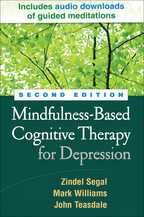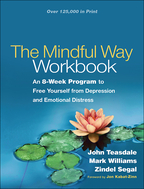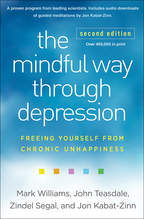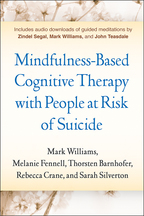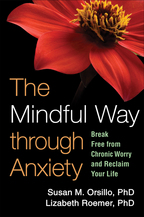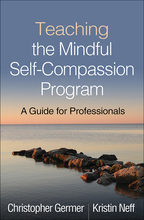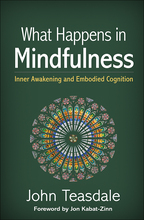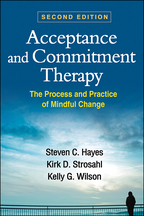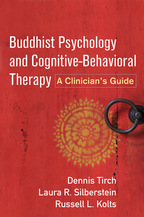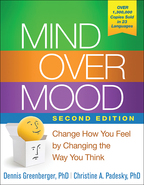Mindfulness-Based Cognitive Therapy for Depression
Second Edition
Zindel Segal, Mark Williams, and John Teasdale
Foreword by Jon Kabat-Zinn
HardcoverPaperbacke-bookprint + e-book
Hardcover
orderOctober 23, 2012
ISBN 9781462507504
Price: $83.00 471 Pages
Size: 6" x 9"
Paperback
orderJune 4, 2018
ISBN 9781462537037
Price: $55.00471 Pages
Size: 6" x 9"
Sign up for emails on upcoming titles on Mindfulness (with special discounts)!
“MBCT is a major achievement. Based on a coherent body of experimental work, the treatment has proven its worth in reducing the recurrence of depression and, as a consequence, changing the future prospects of numerous people whose lives are blighted by repeated episodes of this disabling condition. This second edition will be widely welcomed by practitioners; every chapter has been updated and numerous new practical aids have been added, including downloadable practice exercises and handouts. Thoroughly recommended.”

—David M. Clark, DPhil, Professor and Chair of Experimental Psychology, University of Oxford, United Kingdom
“Mindfulness-Based Cognitive Therapy for Depression is the gold standard for anyone who wants to learn this powerful approach. The second edition brings this classic up to date, making it the state-of-the-art guide for therapists and students alike.”

—Daniel Goleman, PhD, author of Emotional Intelligence
“I love this book. More than a book, actually, it is a trusted friend. If you are dedicated to helping vulnerable people stay well and protect themselves from future episodes of depression, you will find what you need here. The program is grounded in rigorous clinical research, sound theory, and an unwavering conviction about the possibility of learning to live each moment fully and wisely. The core building blocks from the first edition remain—step-by-step descriptions of each session, including transcripts, handouts, and rich case illustrations—but there are countless new treasures as well. The themes of many of the sessions have been refined in ways that bring the curriculum even closer to the lived experience of people struggling with recurrent depression. This book stands as an exemplar of how to integrate clinical innovation, science, and practice.”

—Sona Dimidjian, PhD, Department of Psychology and Neuroscience, University of Colorado Boulder
“What began as a thoughtful new approach to treating depression over a decade ago has since changed the face of cognitive therapy. In this truly outstanding second edition, the authors offer crystal-clear instructions for teaching the MBCT program. Important new chapters have been added on embodying compassion and practicing inquiry in the teaching process. The authors review the impressive research on MBCT and offer reflections on how it actually works. Clinicians of all theoretical orientations and levels of experience will discover insights and practical skills that can have a vital impact on how they practice psychotherapy.”

—Christopher Germer, PhD, private practice, Arlington, Massachusetts
“Superb! The authors describe their evidence-based maintenance therapy for depression in great detail, while telling an engrossing (and well-referenced) story of how they developed their approach. Fascinating reading.”

—Ricardo F. Muñoz, PhD, Distinguished Professor of Clinical Psychology, Palo Alto University
“A defining resource in the burgeoning arena of mindfulness-based therapies. The second edition incorporates new evidence from both clinical trials and neuroscientific studies of the mind, continuing the story of discovery of the mindfulness path out of chronic depression. Presented is up-to-date conceptual and clinical material that reflects the experience and wisdom of the authors, their colleagues, and the many individuals who have benefited from MBCT. As a graduate textbook for a course on either major depression or psychotherapeutic uses of meditation, this volume illustrates the theory and application of mindfulness-based approaches in an elegant and always readable manner.”

—Jean L. Kristeller, PhD, Department of Psychology, Indiana State University
“Warmly written, accessible, and deeply insightful. This landmark book has played a key role in making mindfulness a central concern in clinical practice. The up-to-date second edition not only summarizes the extraordinary expansion of research evidence, but also is immensely practical and filled with clinical wisdom. Important, too, is its emphasis on compassion. A 'must' for all therapists interested in mindfulness.”

—Paul Gilbert, PhD, Centre for Compassion Research and Training, University of Derby, United Kingdom
—David M. Clark, DPhil, Professor and Chair of Experimental Psychology, University of Oxford, United Kingdom
“Mindfulness-Based Cognitive Therapy for Depression is the gold standard for anyone who wants to learn this powerful approach. The second edition brings this classic up to date, making it the state-of-the-art guide for therapists and students alike.”
—Daniel Goleman, PhD, author of Emotional Intelligence
“I love this book. More than a book, actually, it is a trusted friend. If you are dedicated to helping vulnerable people stay well and protect themselves from future episodes of depression, you will find what you need here. The program is grounded in rigorous clinical research, sound theory, and an unwavering conviction about the possibility of learning to live each moment fully and wisely. The core building blocks from the first edition remain—step-by-step descriptions of each session, including transcripts, handouts, and rich case illustrations—but there are countless new treasures as well. The themes of many of the sessions have been refined in ways that bring the curriculum even closer to the lived experience of people struggling with recurrent depression. This book stands as an exemplar of how to integrate clinical innovation, science, and practice.”
—Sona Dimidjian, PhD, Department of Psychology and Neuroscience, University of Colorado Boulder
“What began as a thoughtful new approach to treating depression over a decade ago has since changed the face of cognitive therapy. In this truly outstanding second edition, the authors offer crystal-clear instructions for teaching the MBCT program. Important new chapters have been added on embodying compassion and practicing inquiry in the teaching process. The authors review the impressive research on MBCT and offer reflections on how it actually works. Clinicians of all theoretical orientations and levels of experience will discover insights and practical skills that can have a vital impact on how they practice psychotherapy.”
—Christopher Germer, PhD, private practice, Arlington, Massachusetts
“Superb! The authors describe their evidence-based maintenance therapy for depression in great detail, while telling an engrossing (and well-referenced) story of how they developed their approach. Fascinating reading.”
—Ricardo F. Muñoz, PhD, Distinguished Professor of Clinical Psychology, Palo Alto University
“A defining resource in the burgeoning arena of mindfulness-based therapies. The second edition incorporates new evidence from both clinical trials and neuroscientific studies of the mind, continuing the story of discovery of the mindfulness path out of chronic depression. Presented is up-to-date conceptual and clinical material that reflects the experience and wisdom of the authors, their colleagues, and the many individuals who have benefited from MBCT. As a graduate textbook for a course on either major depression or psychotherapeutic uses of meditation, this volume illustrates the theory and application of mindfulness-based approaches in an elegant and always readable manner.”
—Jean L. Kristeller, PhD, Department of Psychology, Indiana State University
“Warmly written, accessible, and deeply insightful. This landmark book has played a key role in making mindfulness a central concern in clinical practice. The up-to-date second edition not only summarizes the extraordinary expansion of research evidence, but also is immensely practical and filled with clinical wisdom. Important, too, is its emphasis on compassion. A 'must' for all therapists interested in mindfulness.”
—Paul Gilbert, PhD, Centre for Compassion Research and Training, University of Derby, United Kingdom

